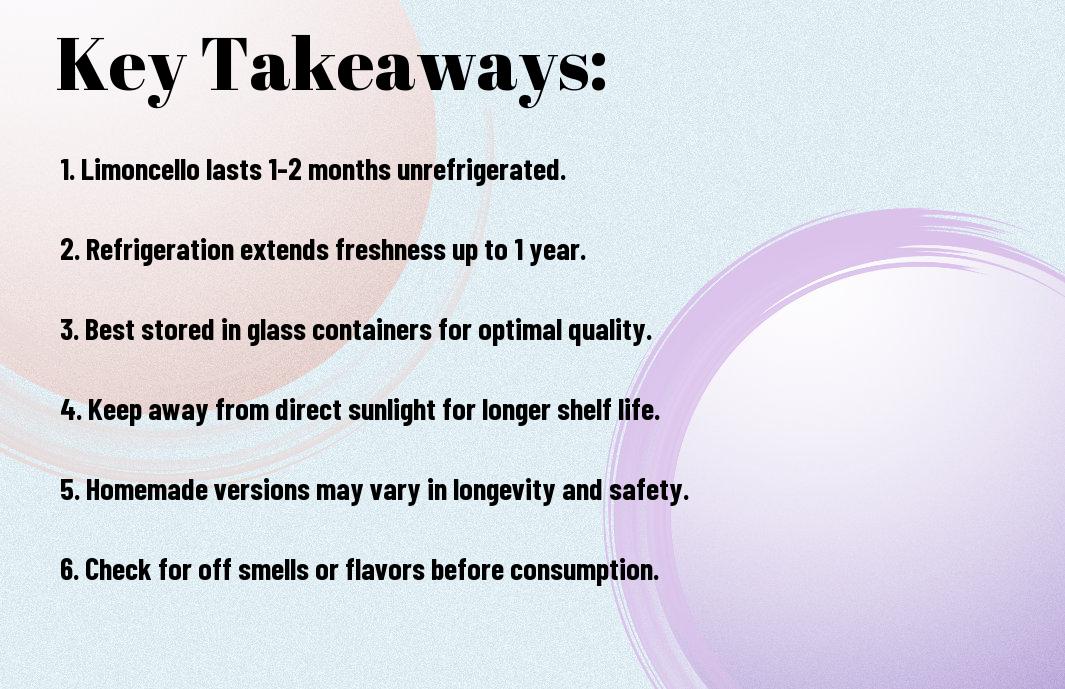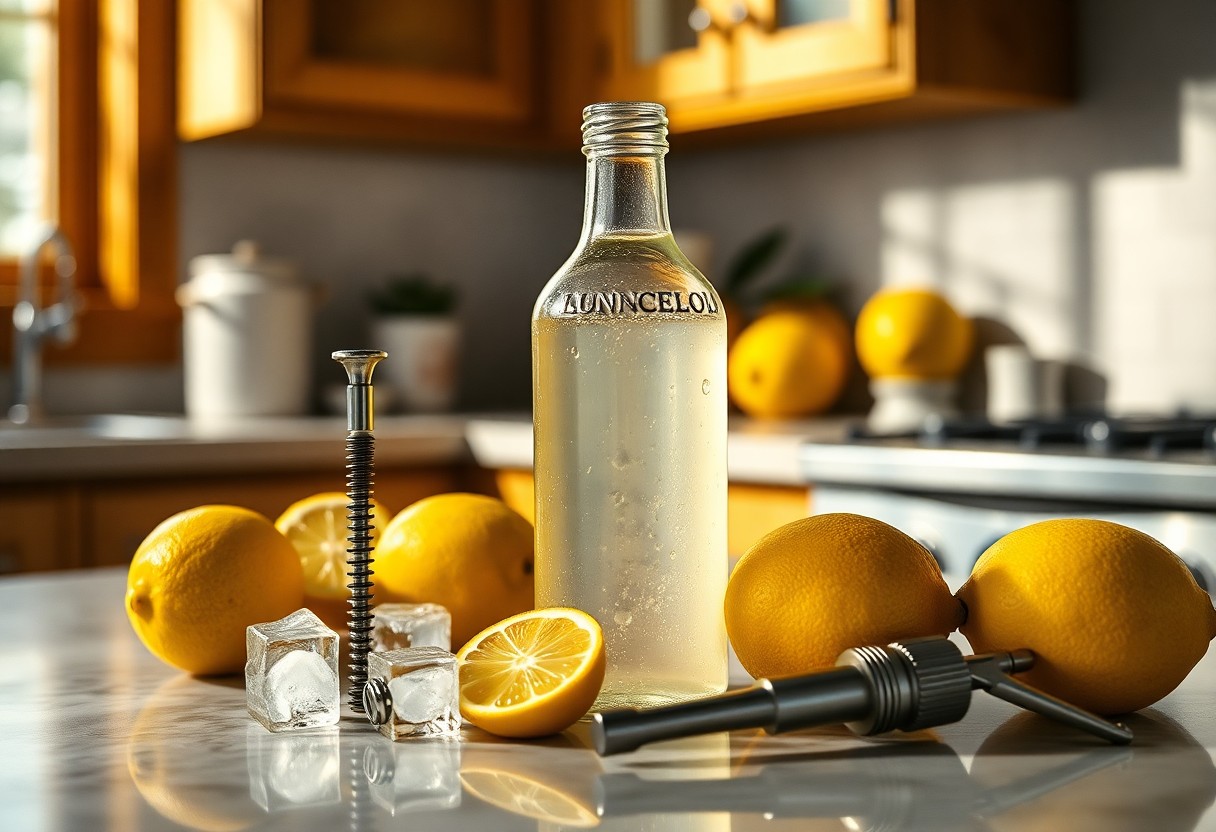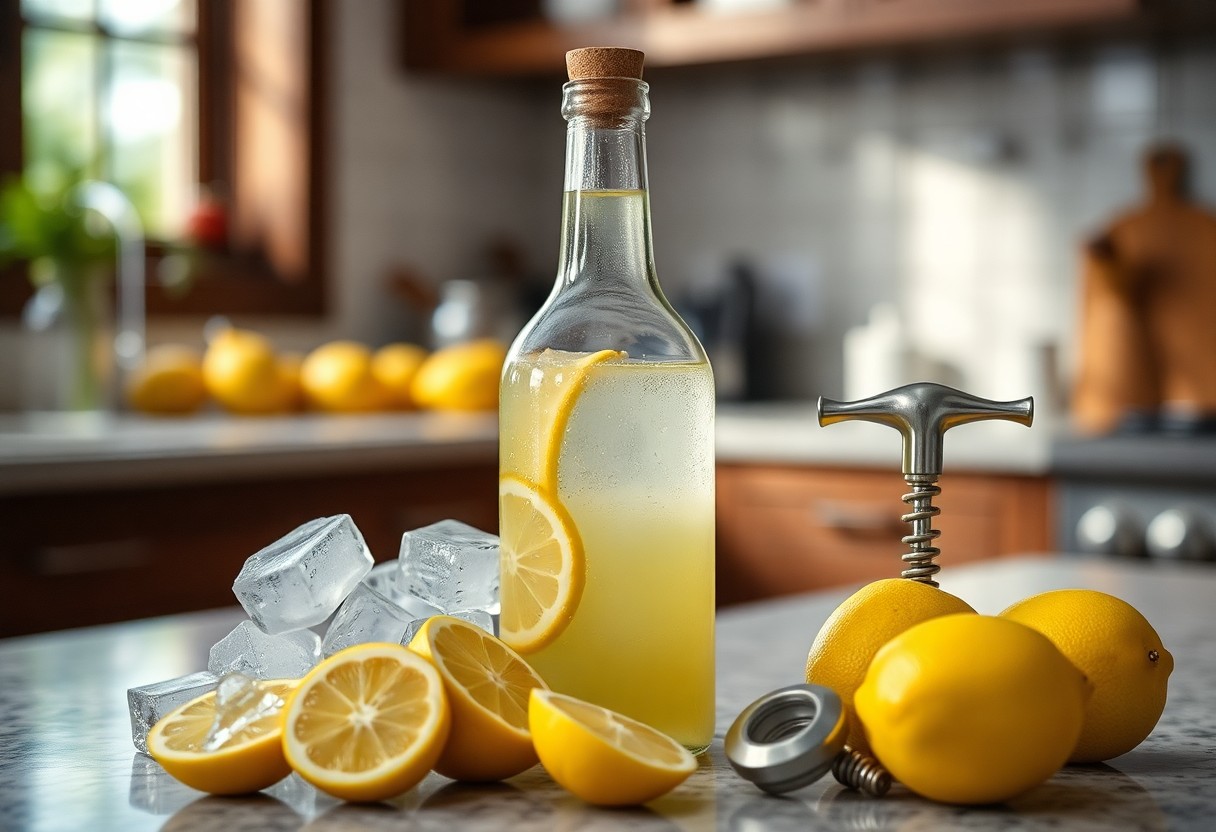Most people who craft their own limoncello wonder how long their delicious creation will last. Understanding the shelf life of your homemade limoncello is important to enjoying its vibrant flavors safely. Typically, when stored properly, your limoncello can stay good for up to two years. However, factors like sunlight exposure and temperature can affect its quality. In this post, we’ll explore how to store your limoncello effectively and tips to ensure it remains delightful throughout its shelf life.
Key Takeaways:
- Homemade limoncello can remain good for up to 3 years if stored properly in a cool, dark place.
- To maximize freshness, store limoncello in airtight glass bottles and avoid exposure to sunlight and heat.
- Always check for any changes in color, taste, or smell before consumption, as these can indicate spoilage.


Understanding Limoncello
While many enjoy a refreshing glass of limoncello, it’s important to understand its origins and characteristics. This vibrant lemon liqueur hails from Italy, where it has become a beloved tradition, often served as a digestif. Its zesty flavor and bright yellow hue make it a delightful addition to various cocktails or a tasty treat on its own.
What is Limoncello?
Below, you’ll find that limoncello is a sweet, lemon-flavored liqueur that is traditionally made by infusing lemon zest in alcohol. This process creates a bright, flavorful drink that captures the essence of fresh lemons, making it a favorite for both sipping and mixing in cocktails.
Ingredients Used in Homemade Limoncello
Around the world, the primary ingredients for homemade limoncello include fresh lemons, alcohol (usually vodka or grain alcohol), sugar, and water. These components come together to create a refreshing beverage that is both easy and rewarding to make.
The quality of lemons you use significantly affects the final product. Choose organic, unwaxed lemons to avoid any unwanted chemicals; their zest is the heart of the flavor. A high-proof alcohol such as neutral grain spirits or vodka provides the best base for extraction, while sugar helps balance the sourness of the lemon. Lastly, adding water after infusing helps to mellow the liqueur’s strength, enhancing the overall flavor. Your careful selection of these ingredients will lead to a remarkable homemade limoncello.
Shelf Life of Homemade Limoncello
Some enthusiasts enjoy crafting their own homemade limoncello, but understanding its shelf life is important for optimal flavor and quality. Typically, homemade limoncello can last for about 1 to 2 years when stored properly. Factors like the quality of ingredients and storage conditions play a significant role in preserving its taste and potency.
Factors Affecting Shelf Life
Shelf life can vary based on several factors, including:
- Alcohol content – Higher alcohol content can extend shelf life.
- Storage temperature – A cool, dark place is ideal for preservation.
- Ingredient quality – Fresh, quality lemons contribute to longer-lasting flavor.
This means that by considering these elements, you can enjoy your limoncello for a longer period while retaining its unique taste.
Signs of Spoilage
Life can be unpredictable, and the quality of homemade limoncello can diminish over time. Visible signs of spoilage may include changes in color, cloudiness, or a strange odor, indicating that the drink has degraded. However, limoncello with a high alcohol content may still be safe to consume even if it loses flavor. Make sure to always trust your senses; if something seems off, it’s wise to discard it. Indeed, enjoying limoncello at its best will elevate your experience, ensuring that it retains rich, tangy notes and delightful freshness.

Storage Tips for Homemade Limoncello
Now that you’ve crafted your delicious homemade limoncello, proper storage is important to keep it tasting great. Follow these tips for optimal preservation:
- Store in a glass bottle to avoid chemical reactions.
- Keep it in a cool, dark place like a pantry.
- Seal tightly to maintain freshness and prevent oxidation.
- Consider refrigeration for long-term storage to enhance flavor.
Assume that with proper storage, your limoncello will maintain its vibrant taste for months to come.
Best Practices for Storage
Around your limoncello, take note of the best practices for storage. Always ensure that your bottles are thoroughly cleaned and sanitized before filling them. This step helps eliminate any lingering contaminants that may alter the flavor of your drink. Opt for smaller bottles if you intend to consume the limoncello in smaller portions, allowing for less oxygen exposure each time you open a bottle.
Ideal Storage Conditions
Homemade limoncello thrives under specific storage conditions to preserve its quality. Aim to keep it in a steady environment where temperature fluctuations are minimal, as extreme changes can affect the flavor and stability. A dedicated shelf in your refrigerator or a dark, cool cupboard works best to ensure the ideal conditions. Avoid direct sunlight and high heat; exposure can lead to unwanted spoilage. Best practices include checking the seals regularly to ensure they remain airtight, significantly reducing the risk of evaporation or contamination. Properly cared for, your limoncello can deliver delicious enjoyment for many months.
Serving Suggestions
All homemade limoncello can elevate your gatherings and provide refreshing moments after a meal. Serve it ice-cold in small glasses for the best experience. Sip it slowly to savor the bright, zesty flavors, and don’t hesitate to add a splash to cocktails or serve it over ice for a delightful twist.
How to Serve Limoncello
At its best, limoncello should be served ice-cold to enhance its refreshing citrus profile. Store your limoncello in the freezer, and pour it into small, chilled glasses, allowing the vibrant flavors to awaken your senses. This method not only preserves the taste but also provides a pleasant, crisp experience.
Pairing Limoncello with Food
Between the vibrant citrus notes of limoncello, you can find delightful pairings with various foods. This zesty liqueur complements rich flavors, cuts through fatty dishes, and refreshes the palate after heavier meals.
Considering the flavor profile of limoncello, it pairs well with seafood, light salads, and desserts. When indulging in a creamy risotto, a splash of limoncello refreshes your palate. Additionally, it beautifully enhances fruit-based desserts like sorbet or panna cotta. You may also enjoy it alongside cheese platters, especially with tangy varieties like goat cheese. Embrace the contrasts as it can truly elevate your culinary experience if you explore these pairings.
Frequently Asked Questions
After incorporating your homemade limoncello into your life, you may have some questions about its shelf life and best practices for storage. Understanding how long it stays good and the right conditions for keeping it fresh can enhance your enjoyment of this delightful liqueur.
Can You Freeze Limoncello?
Along with keeping limoncello in the freezer, you can enjoy a chilled glass straight from the icebox. The alcohol content prevents it from freezing solid, allowing for a refreshing slushy texture. Just be sure to use an airtight container to avoid any undesirable flavors from other foods.
How to Extend the Shelf Life?
Across your limoncello experience, it’s beneficial to adopt some strategies for maintaining its freshness. Proper storage is important for preserving the flavor and quality over time.
Hence, to extend the shelf life of your homemade limoncello, store it in a cool, dark place away from direct sunlight and heat sources. Using sterilized bottles and ensuring a tight seal can help prevent oxidation. If you notice any changes in color, scent, or taste, these could be indicators of spoilage, so dispose of any questionable liquid promptly. Storing limoncello in the freezer not only enhances its taste but also preserves its vibrant flavors for a longer duration.
Final Words
With this in mind, homemade limoncello can stay good for about 1 to 2 years when stored properly in a cool, dark place. To maintain its vibrant flavor and quality, always use clean, airtight containers and avoid exposure to sunlight. You can enjoy your limoncello straight from the freezer or use it in cocktails, but keep an eye on its appearance and aroma to ensure it remains at its best. Happy sipping!
FAQ
Q: How long does homemade limoncello last when stored properly?
A: Homemade limoncello can last for about 1 to 2 years when stored properly. Keeping it in a cool, dark place and ensuring it’s sealed tightly can help maintain its flavor and quality over time. While it may still be safe to consume after this period, the taste and aroma may start to diminish.
Q: What is the best way to store homemade limoncello?
A: The best way to store homemade limoncello is to place it in a glass bottle with a tight seal. It should be kept in a cool and dark area away from direct sunlight or heat sources. For longer-term storage, you can also place the limoncello in the freezer, which can help enhance its refreshing taste and maintain its quality.
Q: Can homemade limoncello go bad?
A: While homemade limoncello has a long shelf life due to its high alcohol content, it can eventually go bad. Signs of spoilage include an off smell, strange color changes, or sediment forming at the bottom of the bottle. If you notice any of these signs, it’s best to discard it.
Q: How can I tell if my homemade limoncello is still good?
A: To determine if your homemade limoncello is still good, check for any changes in smell, visual appearance, or taste. If it smells off, has changed color, or has developed a bitter taste, it is advisable not to consume it. When in doubt, it’s better to err on the side of caution and dispose of it.
Q: Should I refrigerate or freeze homemade limoncello for the best quality?
A: It is not necessary to refrigerate homemade limoncello, but doing so can help enhance its texture and flavor, especially if you prefer a chilled liqueur. Freezing limoncello is also an excellent option, as it keeps it colder longer and prevents it from freezing solid, maintaining its delicious consistency while prolonging its shelf life.
